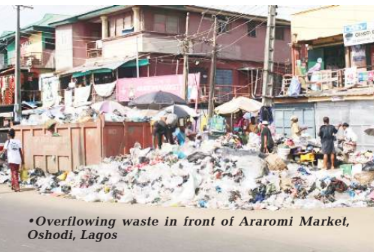By Johnson Matthew
From Mile 12 to Oshodi, and across several neighborhoods, Lagos residents are groaning as foul odor, clogged drainages and heaps of festering refuse turn Nigeria’s commercial hub into a city gasping for breath. The unmistakable stench of decay now hangs heavily in the air, with waste piled up in several communities. From bustling markets to residential streets, Lagos appears to be drowning in its own filth, leaving millions of residents battling foul air and a metropolis struggling to survive its sanitation crisis.
Saturday Vanguard observed that in parts of Lagos, residents now channel their faeces directly into open drainage many of which remain stagnant for weeks. When the rains arrive, the drainage overflows, washing human waste across the streets and mixing it with floodwater. The result is a nauseating cocktail of filth that forces residents and passersby to wade through barefoot, often unaware they are trudging in water filled with faeces and a breeding ground for epidemics waiting to erupt.
This disturbing reality came to the fore recently in Festac Town, Amuwo Odofin Local Government Area, where a civic group, Bring Back Festac, staged a protest over what they described as the community’s gradual descent into filth.
In Ajeromi Ifelodun Local Government Area , Oshodi, Mile 12, Iyana Ipaja and many other areas, the stench hits before the eyes can take in the scene. Heaps of refuse mount at street corners, plastics choke the drainage, and floodwater carries with it the stench of rot. For many, foul odour is no longer a nuisance but a daily torment.
Refuse floods roads
During a visit to Akpiri Street in Olodi Apapa area of the state, residents, desperate to fix potholes have filled them with refuse, only for the rains to turn the road into a flood of garbage.
A resident, who simply identified herself as Doris, said “the stench is unbearable,” covering her nose with her wrapper.
Also in Oshodi Terminal 1, a cleaner Mrs. Boluwatife Iye said the problem extends beyond refuse. She said, “People urinate anywhere, on pedestrian bridges and by the roadside even though there are public toilets inside the terminal. The drainage is choked with nylon every day. That is why Oshodi always stinks”.
A load carrier, popularly called ‘alabaru’ accused homeless Nigerians who sleep under the bridges of being responsible for the stench in Oshodi. He said : “Many wheelbarrow pushers and youths who live under the bridges bathe, urinate and defecate there. We don’t have anywhere else to go”, he confessed.
At Mile 12, the stench has become a landmark. Rotting fruits and vegetables pile up daily, releasing a suffocating odor that envelops the entire neighborhood. “Before you reach the market, you are already overwhelmed with foul odour”, said Miss Odebumi, a resident. In Ikeja, a shop owner who identified himself simply as Kelvin, summed up the city’s frustration: “Clogged drainage, littered roads, poor waste management, that’s the real problem. The foul odour is only a reminder that the city is rotting.”
Absence of toilets
The absence of toilets in many Lagos markets has worsened the crisis. Traders, with no other option, urinate or defecate in buckets inside their stalls and later dispose of the waste into the drainage, compounding the stench.
Even in markets where commercial conveniences exist, some traders avoid paying the small fee, preferring to defecate within their shops. Amid the stench, food vendors still hawk meals in the same spots, while patrons, holding their noses, complain of the odour even as they buy and eat, an irony that underscores the depth of the crisis.
LAWMA Delays
Investigations also revealed that in many markets, heaps of refuse linger for days because of delays by the Lagos Waste Management Authority LAWMA. Traders said scavengers raid the waste in search of recyclables, scattering tied bags and leaving the area buzzing with flies.
Residential areas fare no better, as overflowing bins remain unattended for weeks. Some residents alleged that LAWMA trucks come only once in two weeks, while others said non-paying households dump their refuse at night on road medians and into drainage, worsening the menace.
“LAWMA trucks don’t come on time. So people pile garbage in front of their houses. That’s why the odour is everywhere,” said Mr. Timothy Idialu, when approached. Corroborating Idialu’s position, another trader in Boundary market, Kafayat Oniselu said, “When cart pushers were coming every day to collect our dirt, the market was cleaner. But they stopped since government officials started arresting them. Since then, the refuse just keeps piling up.”
Another trader, Mr. Chinedu, echoed her anger. “We are stuck with mountains of dirt because LAWMA trucks don’t come on time. The odour is killing us and chasing customers away,” he said, pointing at a buzzing heap by his stall.
When contacted, LAWMA’s Public Relations Officer, Mrs Shade Kadiri, promised to call back, explaining that she was driving. She however failed to call back as at the time of going to press.
The post Filth killing us — Lagos residents, traders lament appeared first on Vanguard News.

